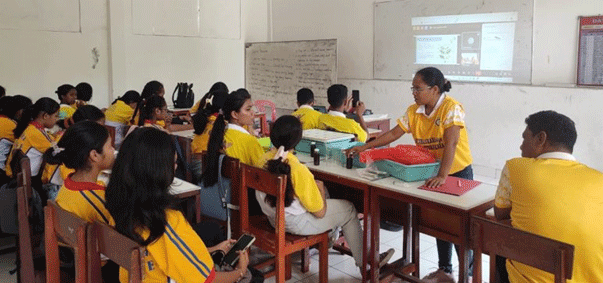Students at SMAK Syuradikara are learning hydroponic farming through the innovative Cakap Class program. This article explores how these young learners are acquiring skills in soilless agriculture, offering insights into how hydroponics can promote sustainable farming and food independence.
Hydroponics: A Classroom for Future Farmers
At SMAK Syuradikara, a private Catholic high school in Indonesia, 25 students are actively participating in a practical hydroponics course as part of the Cakap Class program. This course is not only helping them develop hands-on skills in sustainable farming but also bridging gaps in agricultural technology for the younger generation. The program, initiated in May 2024 by PT Cerdas Digital Nusantara, has been offering students valuable lessons on how to grow plants without soil, using only water and nutrients.
The students, like Andro Siga Bao, have embraced the opportunity to learn hydroponics in a unique educational environment. “We’ve attended several classes, but the hydroponics practicals have given us real-world skills we can use in the future,” says Andro. He and his peers have learned how to cultivate crops like kangkung (water spinach) and celery, all without traditional soil-based methods.
The Rise of Hydroponics in Education
Hydroponic systems, which use water as a growing medium, are increasingly being adopted in educational settings as a tool for teaching sustainable farming practices. In the case of SMAK Syuradikara, the students’ enthusiasm has been fueled by online demonstrations and live Zoom mentorship sessions with experts. They were taught the essentials of hydroponic farming, from nutrient management to plant selection, under the guidance of mentors like Angelia Diana Fadhe, an English teacher and hydroponic course coordinator.
According to Angelia, the aim is for students to leave with a comprehensive understanding of how hydroponics works and how it can contribute to sustainable food production. “The students have learned the basics—plant choice, system setup, and nutrient solutions. It’s not just about farming; it’s about preparing them for future challenges in agriculture,” she explained.
The Benefits of Hydroponics: A Global Perspective
Hydroponic farming has been gaining global traction due to its efficiency, sustainability, and adaptability to various environments. According to a 2023 report from MarketsandMarkets, the global hydroponics market is projected to reach USD 12.1 billion by 2026, driven by rising demand for food in urban areas and limited access to arable land. In regions with high urbanization, like Indonesia, hydroponics offers an innovative solution to growing food without relying on expansive farmland.
One of the key benefits of hydroponics is its reduced water usage. A study by the University of Arizona suggests that hydroponic systems use up to 90% less water than traditional soil-based farming, making them an ideal solution for areas facing water scarcity. The system also enables faster crop growth and higher yields, as plants are provided with optimal conditions in a controlled environment.
The students at SMAK Syuradikara are not just learning to grow crops—they’re gaining practical insights into how agriculture can adapt to future environmental and technological challenges. “I enjoyed the hands-on experience of growing plants like celery and water spinach,” said Alya, another student in the program. “It’s exciting to think about how this can be applied in the real world, where resources are limited, but the need for food is growing.”
Hydroponics and Food Independence
The hydroponic program at SMAK Syuradikara is designed to teach students not only about sustainable farming but also about food independence. As Bruder Kristianus Riberu, the school’s head, explains, the program is an important step in teaching young people how to produce their own food sustainably, ensuring food security for future generations. “This helps students understand the importance of producing food in a self-sufficient manner, bridging technological gaps in agriculture,” Bruder Kris said.
In today’s world, food independence is becoming more critical, especially with increasing environmental challenges like climate change, soil degradation, and limited water resources. Programs like the one at SMAK Syuradikara equip students with the knowledge and skills needed to grow food sustainably, helping communities become less reliant on traditional, resource-heavy farming methods.
The hydroponic farming initiative at SMAK Syuradikara showcases the potential of agricultural education to shape future generations of farmers, scientists, and agricultural engineers. Through this hands-on approach, students are learning the essential skills needed to promote sustainable farming and food independence. With the increasing global demand for food and the challenges posed by climate change, these students are well-positioned to contribute to a more sustainable and resilient agricultural future.











